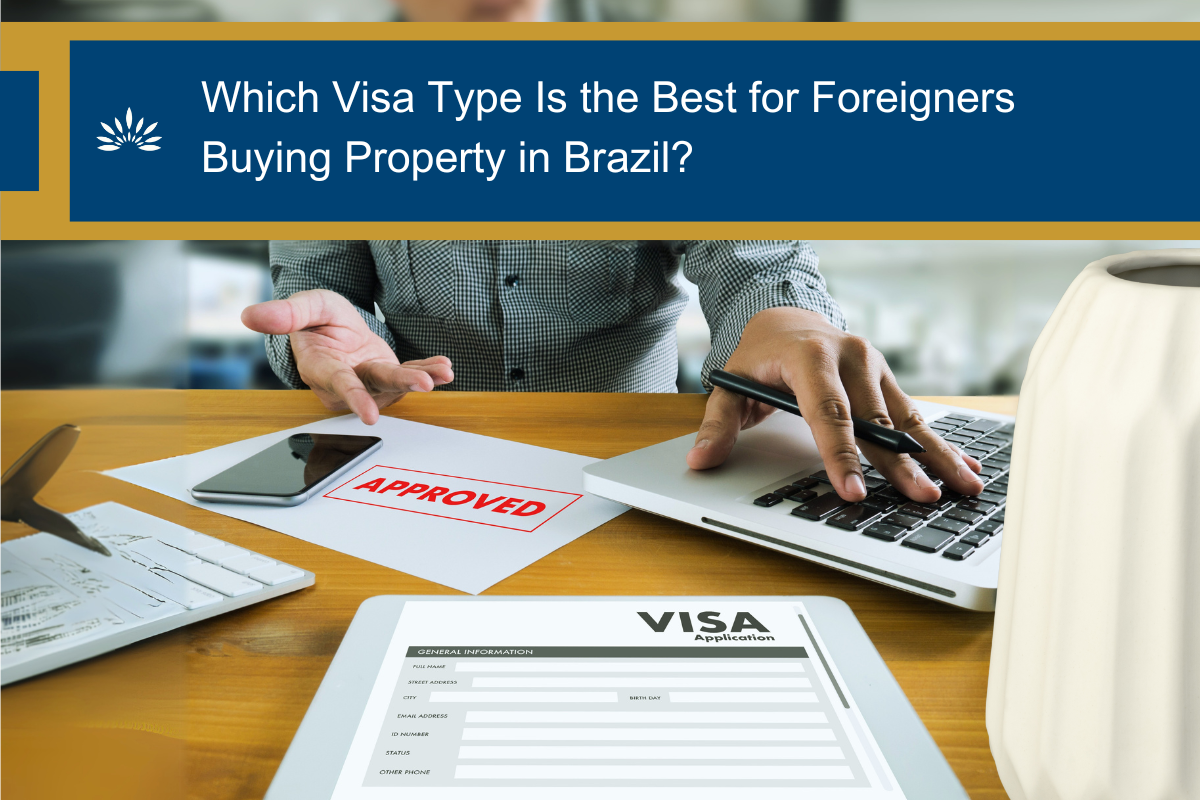Buying Property in Brazil: Finding Your Ideal Visa Path
Are you torn between the flexibility of an investor visa or the ease of a retirement visa to secure your long-term stay? This article breaks down multiple pathways to buying property in Brazil, so you can confidently choose what aligns with your real estate goals and lifestyle.
Which Visa Type Is the Best for Foreigners Buying Property in Brazil?
Buying Property in Brazil: Which Visa Type Is the Best for Foreigners Buying Property in Brazil?
Imagine two friends chatting over coffee in a lively café in São Paulo. They are excitedly discussing their plans to settle down and make a real estate investment in Brazil. One friend wonders whether a brazil investor visa is the simplest route, while the other thinks a brazil retirement visa might be the perfect solution. They both heard rumors of different visa categories that allow foreign real estate investment and the ability to purchase Brazilian real estate, but they feel uncertain about the real estate laws and the details involved. Perhaps you find yourself in a similar situation, dreaming of that perfect condo in the bustling real estate in Brazil market of São Paulo or a cozy coastal property in Bahia. You want clarity on which visa you need, how the real estate purchase process unfolds, and how to make it all fit your lifestyle.

In this post, we’ll focus on Buying Property in Brazil. Our main goal is to help you determine precisely which visa type is best for foreigners buying property in Brazil. We’ll explore investor visas, retirement visas, and work-related permits as possible pathways to own or invest in real estate within the country. Along the way, we’ll cover the nuances of real estate investments, real estate opportunities in different regions, and practical tips to ensure you’re fully prepared for this life-changing move. By the end, you’ll have a thorough grasp of navigating brazilian real estate regulations, meeting documentation requirements, and understanding whether you should talk to a real estate agent, an attorney, or government officials first. So grab a cup of coffee, find a comfortable seat, and let’s dive deep into your potential new adventure in Brazil.
Looking for Expert Guidance? Let Us Help!
[email protected]
+55 (21) 4042-0633
+1-214-438-3777
Understanding the Importance of Visas When Buying Property in Brazil
If you’re considering a foreign real estate investment—be it in the vibrant neighborhoods of Rio de Janeiro, the business-centric communities of São Paulo, or the tranquil beaches of Bahia—securing the right visa status is crucial. This visa not only determines how long you can stay in the country but also affects your financial transactions, the real estate purchase process, and your general legal standing in Brazil.
Specifically, if you’re looking to live in your newly acquired property full-time, you’ll need a long-term visa rather than just a tourist visa. Having the proper permit opens doors to establishing local bank accounts, seamlessly transferring funds, and navigating local bureaucracies. On the flip side, if you’re just making a real estate investment in Brazil to use as a holiday home, your visa approach might be quite different. Therefore, before engaging a real estate agent or setting your sights on a particular neighborhood, you’ll want to nail down the details of the visa that best suits your objectives.
How Visas Affect Brazilian Real Estate Purchases
A frequent question is whether foreigners can buy property in Brazil without any specific visa. Technically, yes—you can legally purchase real estate in brazil on just a tourist visa. However, owning property does not necessarily grant you the right to live in it year-round. If your aim is a permanent or semi-permanent stay, a targeted visa becomes essential. Moreover, certain visa types facilitate your real estate investments and related financial transactions.
For instance, an investor visa typically includes perks such as opening local bank accounts more easily, establishing lines of credit, and receiving preference for certain business-related activities. This smoother integration into the economic framework of Brazil can be a significant advantage when dealing with real estate laws and local realtors.
Crucial Questions Before You Choose a Visa
When deciding which visa type is best for foreigners buying property in Brazil, consider:
- Duration of Stay: Are you moving permanently, or is this a vacation home?
- Financial Capacity: Do you meet the investment threshold for a brazil investor visa, or the pension requirements for a brazil retirement visa?
- Work vs. Leisure: Do you want to work or run a business in Brazil, or simply relax and enjoy your retirement?
- Family Needs: Will you bring dependents, and how might that impact your choice of visa?
- Local Knowledge: Have you explored the local markets with a trusted real estate agent, or are you still in the initial research phase?
We’ll explore these angles, guiding you through investor visas, retirement visas, and work-related permits, pinpointing the one that best aligns with your real estate opportunities and personal goals.
Looking for Expert Guidance? Let Us Help!
[email protected]
+55 (21) 4042-0633
+1-214-438-3777
Investor Visa: A Comprehensive Look for Committed Investors
If you’re keen on real estate investment in Brazil—be it a beachfront property in Rio de Janeiro or a penthouse in São Paulo—an investor visa might be your best option. Often known simply as the brazil investor visa or the “Brazilian investor visa,” it appeals to those aiming to dive into real estate in brazil and bolster their foreign portfolio.
How the Brazil Investor Visa Functions
An investor visa generally requires you to invest a specified minimum sum into the country. While this investment could take the form of a business operation, many people find brazilian real estate to be a simpler, more tangible route. Basic requirements often include:
- Investment Threshold: The Brazilian government sets a baseline amount of money you must invest, and this figure can change. Stay updated via official government channels or consult a legal expert.
- Proof of Funds: You’ll need robust documentation proving the origin and legality of your investment capital.
- Economic Benefit: Some visa categories require a short proposal outlining how your investment supports local economic growth.
Linking the Investor Visa to Real Estate Opportunities
Possessing an investor visa can streamline your real estate purchase process in multiple ways:
- Simplified Banking: Investor visa holders typically face fewer complications when opening local bank accounts or securing financing.
- Heightened Credibility: A recognized investor status can offer credibility to sellers, banks, and government agencies, all of which you may need throughout the foreign real estate investment journey.
Applying for the Brazil Investor Visa Step by Step
It’s always prudent to hire a lawyer for Brazilian property purchase to ensure you’re meeting every legal requirement. Still, here’s a rough outline:
- Check Government Guidelines: Confirm the current minimum investment and qualifications.
- Assemble Financial Evidence: Gather relevant bank statements, tax returns, or asset proofs.
- Submit Your Application: Visit the nearest Brazilian consulate, embassy, or an official online portal.
- Background Verification: Prepare to submit police clearances and other personal documents.
- Transferring Your Funds: Upon approval, you’ll likely transfer the pledged amount to a Brazilian account.
- Complete the Purchase: With your investor status in hand, you can confidently move forward with your real estate investments in Brazil.
Pros and Cons: Is the Investor Visa Right for You?
| Criteria | Investor Visa |
|---|---|
| Residency Benefits | Offers long-term residency with a potential path to permanent status over time. |
| Investment Requirement | Demands a sizable capital outlay, which may vary depending on the country’s economic policies. |
| Ease of Finance | Facilitates banking interactions and property financing. |
| Work Authorization | Typically permits you to work, manage businesses, and further develop your real estate opportunities. |
| Complexity | Requires extensive paperwork, including financial and possibly business-related documentation. |
Should you have the financial capacity and a desire to become a full-fledged participant in the Brazilian economy, the brazil investor visa is likely well-suited for your ambitions. However, if your focus is purely on retirement or you’re lacking the high capital needed, the brazil retirement visa might be more appealing. Let’s explore that next.
Retirement Visa: Tailor-Made for Leisure and Simplicity
For those seeking a sun-kissed refuge during their golden years, the brazil retirement visa is a game-changer. This visa category specifically caters to retirees who wish to immerse themselves in the Brazilian lifestyle—enjoying diverse cultures, warm climates, and often lower living expenses compared to many Western countries.
Who Is Eligible for a Brazil Retirement Visa?
Each country has its own approach to retirement visas, and Brazil is no exception. Generally, you must:
- Meet Age Requirements: Applicants are often required to be 60 years or older, though age thresholds can shift.
- Demonstrate Monthly Pension: You need a stable monthly pension or retirement income that surpasses a government-imposed minimum.
- Maintain a Clean Record: A criminal background check is common, ensuring the safety of local communities.
Brazil Retirement Visa vs Brazil Investor Visa
| Criteria | Retirement Visa | Investor Visa |
|---|---|---|
| Primary Requirement | Steady pension or retirement income | Specific minimum investment in Brazil |
| Residency Duration | Usually extends as long as pension criteria are met | Long-term residency leading to permanent residency if investment conditions hold |
| Paperwork Complexity | Typically simpler, focusing on pension statements and background checks | Involves financial verification, possible business plans, and capital outlay |
| Work Rights | Limited, as it mainly targets retirees | Often provides the freedom to work or run businesses |
| Overall Investment | No large lump sum required beyond property purchase | Necessitates a higher investment threshold |
| Ideal for | Retirees aiming for a peaceful lifestyle | Entrepreneurs, high-capital individuals seeking broader economic engagement |
If you’re near or already in retirement and want the easiest route to owning real estate in brazil, the retirement visa emerges as a top choice. However, those who relish the idea of actively growing a business might find the investor route more suitable.
Looking for Expert Guidance? Let Us Help!
[email protected]
+55 (21) 4042-0633
+1-214-438-3777
Work-Related Permits: Merging Professional Life with a New Home
Perhaps you’re exploring career growth in Brazil’s burgeoning industries—be it tech in Florianópolis, finance in São Paulo, or tourism in Rio de Janeiro—and you also want to make a real estate investment in Brazil. In such instances, a work permit can let you lawfully reside in the country while still participating in the real estate purchase process.
Types of Work Permits in Brazil
Work permits vary in duration and function. Some common categories include:
- Temporary Work Visa: Ideal for project-based contracts or short-term engagements.
- Permanent Work Visa: Usually requires a high level of expertise, or a direct contribution to a Brazilian employer that cannot easily be filled by local talent.
- Specialized Skill Visa: Tailored toward experts in specific fields like engineering, IT, or health care.
How Work Permits and Brazilian Real Estate Intersect
Holding a Brazilian work permit doesn’t automatically grant you the privileges of an investor visa. You’re allowed to live and work, but diving into large-scale foreign real estate investment or managing multiple properties often requires extra paperwork. Nevertheless, a stable job in Brazil can simplify certain aspects:
- Financial Stability: Regular income helps if you’re seeking a mortgage or need to demonstrate financial reliability.
- Long-Term Integration: Working in Brazil immerses you in the culture, language, and local networks, invaluable for real estate investments.
- Future Residency: Many professionals on work permits eventually transition to permanent residency, boosting their credibility in the brazilian real estate market.
Pros and Cons of a Work Visa for Real Estate Opportunities
- Advantages:
- Steady income can improve mortgage eligibility.
- Full immersion in Brazilian culture and business environment.
- Potential path to permanent residency, expanding your property investment scope.
- Disadvantages:
- Ties your stay to your job; losing employment may jeopardize your visa.
- Not specifically designed for large-scale real estate in brazil acquisitions.
- Paperwork can be as intensive as the investor visa route, depending on your employer’s involvement.
If you’re intent on building a professional career in Brazil and also see yourself owning real estate for personal use or foreign real estate investment, the work permit offers a balanced route. Next, we’ll compare all three visa types—investor, retirement, and work permits—so you can make the most informed decision.
Comprehensive Comparison: Investor, Retirement, and Work-Related Visas
To fully tackle “Which visa type is best for foreigners buying property in Brazil?”, consider the following table, which breaks down the core elements of each visa type:
| Criterion | Investor Visa | Retirement Visa | Work-Related Permit |
|---|---|---|---|
| Primary Focus | Large-scale real estate investments or business ventures | Relaxed lifestyle for retirees with stable income | Career building, employment in Brazil |
| Financial Requirement | High minimum investment threshold set by the government | Proof of a consistent pension meeting minimum requirements | Salaried employment, no specific large capital outlay required |
| Residency Status | Long-term residency with a path to permanent residence if conditions are maintained | Continuous residency as long as pension criteria are fulfilled | Linked to employment; can lead to permanent residency if job conditions are met |
| Work Authorization | Typically includes the right to manage your business or conduct work freely | Limited or no work authorization; mainly focused on non-working retirees | Allows you to work for a local employer; entrepreneurial ventures may need extra steps |
| Ideal Properties | High-value listings in Rio de Janeiro, São Paulo, or new developments in growing areas | Bahia beachfront properties, quieter suburban homes, small cities known for their laid-back vibe | Properties near your workplace (Florianópolis, Fortaleza, etc.) |
| Complexity of Application | Moderate to high, needing proof of funds, potential business plan | Lower complexity, focusing on pension proofs and background checks | Can be high depending on employer sponsorship, specialized skill requirements |
| Suitable For | Entrepreneurs, affluent individuals with investment goals | Retirees seeking warm climates and a more modest real estate purchase process | Foreign professionals or specialists looking to merge employment and property ownership |
Essential Legal and Administrative Steps for Foreigners Owning Property in Brazil
Understanding visa categories is just half the story; the other half is navigating real estate laws and local regulations. Below, we delve into the key administrative hurdles you’re likely to face once you commit to buying property in Brazil.
Work with a Specialized Lawyer: Brazil’s real estate laws can be nuanced, particularly for foreigners. Partnering with a lawyer who specializes in foreign real estate investment saves you time, helps you avoid costly mistakes, and ensures that every step is aboveboard. Your attorney can assist with:
- Property Title Checks: Verifying if the property is free from liens or disputes.
- Drafting Contracts: Ensuring the purchase agreement aligns with local real estate laws and your visa conditions.
- Financial Compliance: Guiding you through any currency transfers and ensuring you comply with anti-money laundering regulations.
Gathering Documents for the Real Estate Purchase Process: Although specifics vary, expect to provide:
- CPF (Cadastro de Pessoas Físicas): A tax ID number required for most financial transactions in Brazil.
- Passport: Proof of identity and nationality.
- Visa Papers: Depending on whether you hold a brazil investor visa, brazil retirement visa, or a work permit.
- Proof of Funds: Bank statements or letters of credit indicating you can afford the property and associated taxes.
- Purchase Contracts: Drafted or reviewed by your attorney to protect your interests.
Financial Considerations: Taxes and Fees
Budget for several types of taxes and fees:
- Transfer Tax (ITBI): Paid upon property transfer.
- Property Tax (IPTU): An annual tax levied by local municipalities.
- Capital Gains Tax: If you decide to sell the property in the future, profit may be taxed.
- Legal Fees: Charges for your attorney and any notary services.
Costs vary based on location, property value, and whether the property is residential, commercial, or rural. Always consult your real estate agent or attorney to get an accurate cost breakdown.
Mortgage Possibilities for Foreigners: While it’s possible to secure financing for real estate in brazil as a foreigner, lenders often impose stricter requirements. Having a brazil investor visa or being on a recognized work permit might boost your odds. If local financing proves too cumbersome, alternative routes include financing from your home country or paying in cash.
Exploring the Brazil Property Market: Where to Buy?
Brazil is a tapestry of cultures, climates, and lifestyles. From the skyscrapers of São Paulo to the colonial charm of Bahia, each region offers unique real estate opportunities.
- São Paulo: Economic Powerhouse—High demand for rentals, numerous job opportunities, but can be expensive.
- Rio de Janeiro: Tourism and Leisure—Famous beaches, vibrant nightlife, short-term rental market is robust.
- Bahia: Coastal Serenity—Laid-back atmosphere, lower cost of living, perfect for retirees seeking tranquility.
- Fortaleza: Booming Tourism—Rapid development, strong tourism sector, but thorough due diligence is advised.
- Florianópolis: Tech and Nature—A tech hub with scenic beaches and generally higher property values.
Step-by-Step Guide to Buying Property in Brazil as a Foreigner
Having grasped the visa types and gleaned some regional insights, let’s outline a succinct process:
- Clarify Your Visa Strategy: Decide if the brazil investor visa, brazil retirement visa, or a work permit aligns with your life goals.
- Obtain a CPF: Apply for a CPF (Brazilian tax ID) either at a Brazilian consulate abroad or in Brazil.
- Arrange Your Finances: Assess if you’ll pay cash, seek local financing, or use foreign lenders.
- Engage a Trusted Lawyer: Consult an attorney specializing in Brazilian real estate.
- Consult a Real Estate Agent: A knowledgeable agent can shortlist properties matching your goals.
- Property Viewings and Due Diligence: Visit properties and ensure they’re free from legal complications.
- Negotiate and Sign: Make an offer in writing, then sign a preliminary contract.
- Transfer Funds: Transfer your payment through legal channels.
- Official Registry: Register your ownership at the Real Estate Registry Office.
- Visa Formalities: Ensure the property purchase aligns with your visa requirements.
- Settle In: Move in or rent it out for income.
- Maintain Compliance: Pay taxes, renew your visa, and keep documents updated.
Pro Tip: For legal guidance, visit OliveiraLawyers.com or for real estate inquiries, check out CamilaSaunier.com. Working with the right experts can streamline your buying process.
Scenarios Matching Lifestyle to Visa Choice
Let’s visualize some typical scenarios:
- Scenario 1: The Entrepreneur
You own a profitable business abroad and identify Brazil as the next promising market. You want to buy commercial property in São Paulo and possibly a condominium for personal use. The brazil investor visa suits you perfectly, enabling both business operations and real estate investments.
- Scenario 2: The Retiree
You’re in your late 60s and yearn for a beachfront home with lower living costs. You have a healthy monthly pension and no ambition to work. The brazil retirement visa is an ideal fit, offering a straightforward pathway to owning real estate.
- Scenario 3: The Professional
A Brazilian tech firm hires you for an important role in Florianópolis. While living there, you discover your dream waterfront property. You decide to purchase it using your work permit as an initial step toward potentially applying for permanent residency later. This route merges professional growth with a comfortable living situation.
Maintaining Your Visa Status Post-Purchase: After acquiring brazilian real estate, you’ll want to keep your visa valid. This usually involves:
- Regular Renewals: Some visas must be renewed every couple of years.
- Proof of Pension or Investment: For retirement or investor visas, you must periodically show financial thresholds are still met.
- Local Obligations: Stay current with taxes and keep your documents updated.
Any change—like switching from an investor visa to a retirement visa—should be discussed with a legal expert to avoid jeopardizing your residency rights.
What Lies Ahead: Evolving Real Estate Opportunities in Brazil
Brazil’s real estate sector continues to attract global interest. With ongoing infrastructure projects, favorable exchange rates, and tourism growth, places like Fortaleza and Florianópolis are becoming more popular for real estate investment in Brazil. Moreover, the government frequently reevaluates its policies, occasionally introducing incentives or updating minimum investment criteria.
Conclusion
What’s your biggest concern about investing in Brazil? Let us know in the comments!
For professional support, contact Camila Saunier International Realty to explore your real estate options or Oliveira Lawyers for legal assistance. Together, they’ll help make your Brazilian property dreams a reality.
Determining which visa type is best for foreigners buying property in Brazil hinges on your financial situation, age, professional aspirations, and the ultimate purpose of your property purchase. The brazil investor visa works wonders for high-capital investors wanting to engage deeply in the Brazilian market. Meanwhile, the brazil retirement visa caters to those seeking a relaxed lifestyle underpinned by a stable pension. Work permits accommodate career-focused individuals who also desire the benefits of property ownership.
In all scenarios, it’s vital to consult knowledgeable professionals—be they attorneys with expertise in real estate laws or a seasoned real estate agent who comprehends local dynamics. Buying Property in Brazil can indeed be smooth and rewarding if you do your research, align with the correct visa pathway, and approach the market with realistic expectations.
Now, over to you: What’s your biggest question or concern about getting started with your real estate investments in Brazil? We’d love to hear from you! If you’re ready to move forward, schedule a consultation for Brazil property investment or reach out to a Brazilian real estate agent. Your future home (or next big investment) might be closer than you think!
12 Frequently Asked Questions (FAQs)
1. What are the legal requirements for foreign real estate investment in Brazil?
You must obtain a CPF (Brazilian tax ID), comply with real estate laws, and register your property in the local Real Estate Registry. Working with a specialized lawyer is highly recommended.
2. Which visa type is best for foreigners buying property in Brazil?
It depends on your situation. A brazil investor visa suits those ready to make a sizable financial commitment, a brazil retirement visa is perfect for retirees with a steady pension, and a work permit fits professionals employed by a Brazilian company.
3. Can I legally purchase real estate in Brazil on a tourist visa?
Yes. You can buy property as a tourist, but a specialized long-term visa is advisable if you plan to live in the property or manage ongoing real estate opportunities in the country.
4. How do I apply for a brazil investor visa?
You generally apply through a Brazilian embassy or consulate. You’ll need to show proof of funds, potential business or investment plans, and a clean criminal record. Once approved, you transfer the required capital and proceed with the real estate purchase process.
5. Why should retirees consider a brazil retirement visa?
It provides the simplest route to year-round residency for those with steady pension income. No large capital outlay is necessary beyond your property purchase, and it’s ideal if you want a laid-back lifestyle.
6. Are there taxes I should plan for when buying property?
Expect transfer tax (ITBI), property tax (IPTU), and possibly capital gains tax if you later sell. Consult with a lawyer or your real estate agent for specific regional rates.
7. What documents do I need for the real estate purchase process?
Typically, a valid passport, CPF, visa documentation (if applicable), and proof of funds. Additionally, your attorney will draft or review all purchase contracts.
8. How challenging is it to obtain a mortgage as a foreigner?
Foreigners face more stringent lending requirements and higher interest rates. Holding a work permit or an investor visa can improve your chances, but you may still find alternative financing options more practical.
9. How do I keep track of visa application fees?
Visa fees differ based on your home country and the visa category. Check with the Brazilian consulate or consult an immigration attorney for up-to-date figures.
10. What qualifies me for a brazil retirement visa?
Usually, applicants must be over 60 (or a similar threshold) and demonstrate a monthly pension that meets or exceeds Brazil’s required minimum. A clean criminal record is also necessary.
11. Is part-time living allowed in the São Paulo or Rio de Janeiro markets if I have a tourist visa?
Owning property does not prevent part-time living, but you must adhere to tourist visa durations. If you want to stay longer or conduct real estate investments more extensively, consider a suitable long-term visa.
12. What are the benefits of a work visa for real estate opportunities?
A work visa provides stable employment income, making mortgage approvals and ongoing property-related transactions simpler. However, you may need extra documentation for large-scale foreign real estate investment beyond personal housing.
Looking for Expert Guidance? Let Us Help!
[email protected]
+55 (21) 4042-0633
+1-214-438-3777





